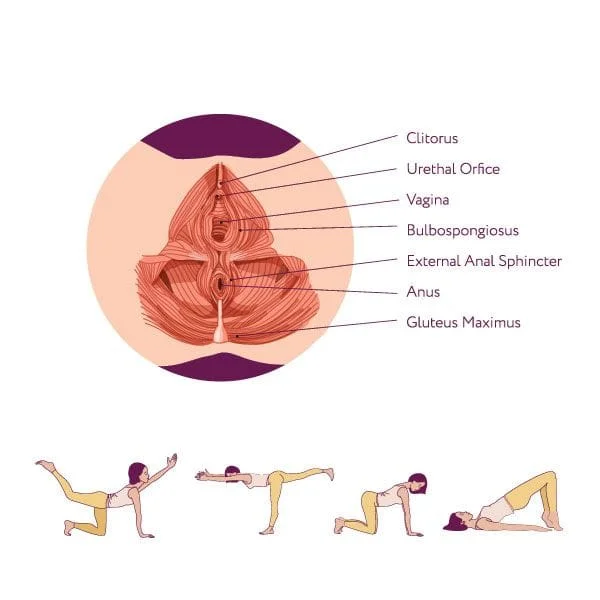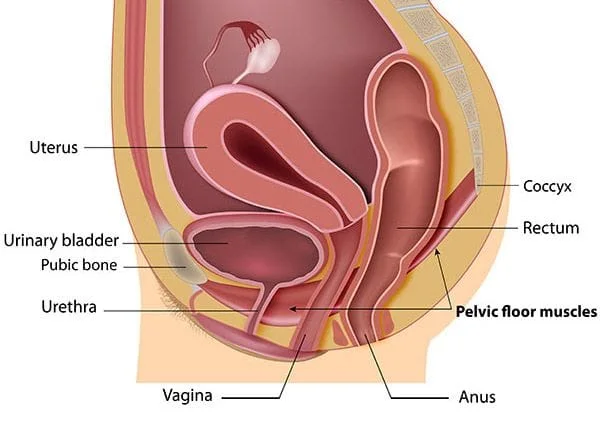What is the Pelvic Floor?
In women, the pelvic floor consists of the muscles, ligaments, connective tissues, and nerves that support the bladder, uterus, cervix, vagina, and rectum. Men also have a pelvic floor consisting of the muscles, connective tissues, and nerves that support the bladder, prostate, and bowel.
Your pelvic floor muscles stretch from your tailbone in the back to your pubic bone up front, and from one hip to the other side to side. They move up and down like a trampoline, or a hammock if you will, supporting your internal organs.
Holes open up in your pelvic floor muscles for your anus, urethra (where urine leaves your body), and vagina (in women). Muscles wrap around these holes and help to keep the anus, vagina and urethra shut. Two additional muscles, the anal sphincter and urethral sphincter, provide extra control to the anus and urethra respectively.
What is the Function of the Pelvic Floor?
Your pelvic floor holds your internal organs in place and helps them to function.
Your pelvic floor moves up and down like a trampoline supporting your internal organs.
What is Pelvic Floor Dysfunction?
Normally, when you go to the bathroom your body tightens and relaxes its pelvic floor muscles. When you have pelvic floor dysfunction, your body keeps tightening your pelvic floor muscles instead of relaxing them at the appropriate times.
What are the Symptoms of Pelvic Floor Dysfunction?
Weakness or other issues with the pelvic floor can result in fecal incontinence (leaking stool or liquid from the rectum), urinary incontinence, constipation, the need to strain or change positions with bowel movements, pain or pressure felt in the rectum, and muscle spasms in the pelvis.
Other symptoms include: frequently needing to go to the bathroom, feeling like you need to “push”, “squeeze” or force yourself to urinate and/or defecate, pain with bowel movements, having to change positions on the toilet, needing to use your hand to help you eliminate stool, feeling like you’ve never completely “gone”, or that you’re unable to completely empty your bowels.
What causes Pelvic Floor Dysfunction?
Pregnancy is the most common cause of pelvic floor dysfunction. Your pelvic floor muscles and tissues can become strained during pregnancy and childbirth, especially if your labor was long or difficult. Fecal incontinence can result from damage to, or weakening of, the anal sphincter, the ring of muscles that helps to keep your anus closed.
Other causes include: obesity, heavy lifting, straining associated with chronic constipation, overusing the pelvic muscles (going to the bathroom too often, or pushing too hard), coughing excessively for a prolonged period of time, like in the case of asthma, COPD, emphysema, or smoker’s cough, and trauma or surgery to the pelvis, bowel, or bladder.
Who is at Risk for Pelvic Floor Dysfunction?
Because women are at increased risk for a weakened pelvic floor as a result of pregnancy and childbirth they tend to suffer from more symptoms related to pelvic floor dysfunction than men; however, both men and women are at risk for Pelvic Floor Dysfunction and the condition is more common with age.
Other risk factors include: obesity, heavy lifting, chronic constipation, conditions that cause excessive coughing for a prolonged period of time, like asthma, COPD, emphysema, or smoker’s cough, and a history of trauma or surgery to the pelvis, bowel, or bladder.
How common is Pelvic Floor Dysfunction?
Quite common. It affects roughly one quarter to one third of all women, and becomes more prevalent with age. Nearly 50% of women 80 years of age and older are affected.

What are the Treatments for Pelvic Floor Dysfunction?
Initial treatments may include: biofeedback to learn how to relax and coordinate the muscles in the pelvic floor, pelvic floor physical therapy, and medications.
Other behavior changes to encourage good bowel habits are often advised. Avoid pushing or straining when you have to urinate or have a bowel movement. Go to the bathroom when you have to go. Don’t hold it.


